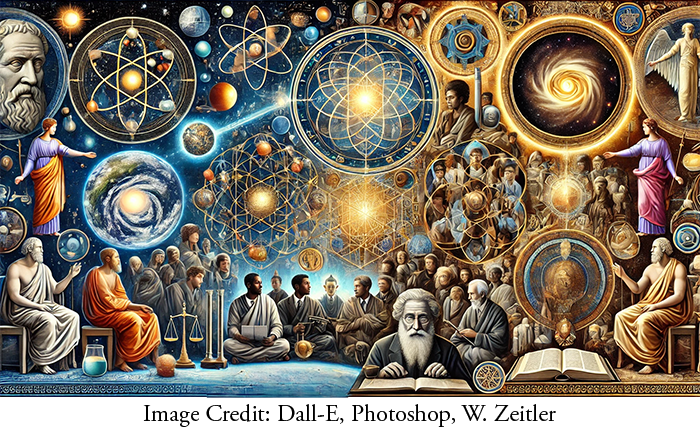In an age where science has unraveled the mysteries of the cosmos, offering us unparalleled knowledge about the physical world, we find ourselves grappling with a profound question: how do we use this knowledge wisely? The distinction between knowledge and wisdom has never been more crucial. While science provides us with facts and understanding, wisdom guides us in applying this knowledge ethically and meaningfully.
The Origins of Philosophy: A Dual Quest for Understanding and Ethical Living
To explore the roots of wisdom, we turn to the origins of philosophy, particularly the pre-Socratic thinkers — Greek philosophers who preceded Socrates (c.470 – 399 BCE). These early philosophers were not only pioneers of rational inquiry but also ardent seekers of ethical living. For them, understanding the cosmos was intrinsically linked with living a virtuous life. Figures like Pythagoras and Heraclitus delved into the nature of reality and human existence, proposing that true wisdom involved a harmonious balance between knowledge and ethical action.
This early philosophical tradition laid the groundwork for a holistic approach to wisdom, one that encompasses both the rational and the ethical. The pre-Socratics saw the universe as an interconnected whole, where understanding the laws of nature also meant understanding the principles of a wise life. Their quest was not merely for intellectual enlightenment but for a way of living that was in harmony with the natural world and human society.
The Role of Religion in the Search for Wisdom
In discussing the pursuit of wisdom, it’s important to consider the role of religion. Throughout history, many religious traditions have provided rich frameworks for ethical living and wisdom. Teachings from various faiths offer guidance on leading a worthy life, emphasizing virtues such as compassion, humility, and justice. However, interpreting these teachings can be complex and varies widely among individuals and cultures.
Let’s acknowledge that religious teachings have provided us with foundational ethical principles. However, the evolving challenges of modern life — technological advancements, environmental crises, and social complexities — sometimes call for an integrative approach that goes beyond traditional religious frameworks. Wisdom today might benefit from a synthesis of philosophical, scientific, and spiritual perspectives, each contributing insights into how we navigate our world.
The Evolving Nature of Wisdom
Wisdom, like knowledge, is not static. As society evolves, so too does our understanding of what it means to live wisely. The contemporary landscape, with its rapid technological changes and global interconnectedness, presents new ethical dilemmas and opportunities. While religious teachings offer timeless wisdom, they must often be interpreted in the context of present-day challenges.
This is where fields like Sacred Geometry and Spiritual Alchemy can come into play, offering modern seekers tools and metaphors to explore deeper connections between the material and spiritual worlds. These interdisciplinary studies bridge ancient wisdom with contemporary insights, providing a holistic view that can inform ethical decision-making in today’s complex world.
A Unified Quest for Meaning
Ultimately, the search for wisdom transcends any single discipline or tradition. It is a universal quest, reflecting humanity’s enduring desire to find meaning and purpose in life, and to live harmoniously with ourselves, our community, and our natural world. Whether through the rigorous pursuit of scientific knowledge, the ethical reflections of philosophy, or the spiritual teachings of religion, the quest for wisdom remains a deeply personal and collective journey.
As we continue to explore and understand our world, let’s remember that wisdom involves not only what we know but how we choose to live. It is a journey of integrating knowledge with ethical action, of harmonizing the rational with the moral. In this ongoing quest, we find not just answers but a deeper understanding of ourselves and our place in the universe.
In this era of unprecedented knowledge, let us also seek the wisdom to use it wisely, guided by the timeless principles of ethical living and the ever-evolving insights of our shared human experience.



Leave a Reply